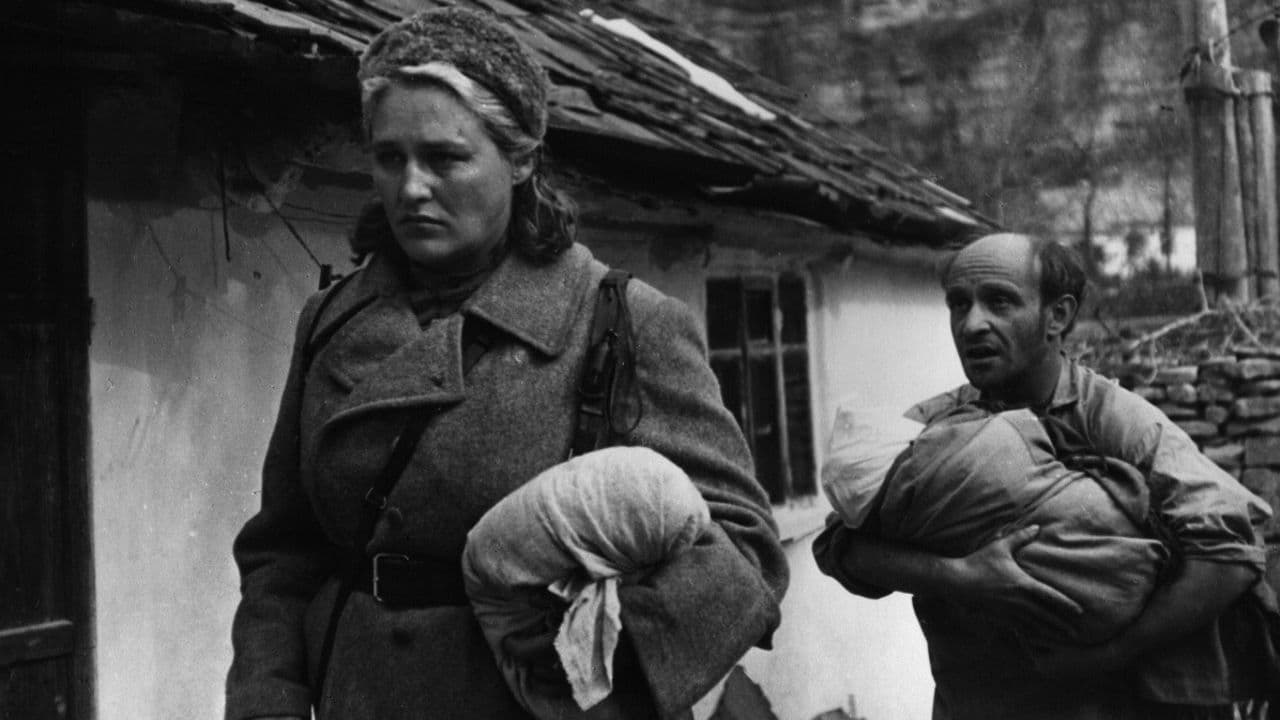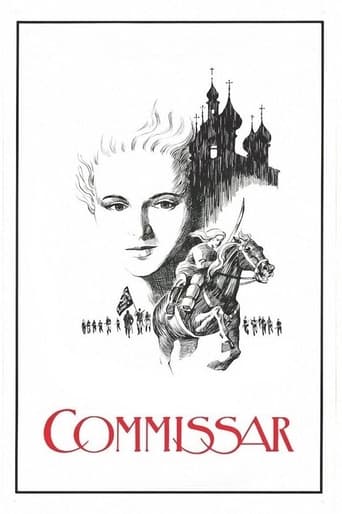

One of the best movies of the year! Incredible from the beginning to the end.
... View MoreWorth seeing just to witness how winsome it is.
... View MoreIt's the kind of movie you'll want to see a second time with someone who hasn't seen it yet, to remember what it was like to watch it for the first time.
... View MoreThe film never slows down or bores, plunging from one harrowing sequence to the next.
... View MoreThe filmography of director Aleksandr Askoldov lists a single film, Commissar. After a single viewing of the film it is easy to assess why no further works exist from Askoldov. Commissar is an ambitious, gutsy, and subversive film. Askoldov had to have been cognizant of the imminent danger it posed against his young career. This (likely) awareness of the inevitability of personal ruin seemingly emboldened Askoldov to move far beyond apoliticism, which was relatively acceptable, to the unthinkable, open hostility. When trivially compared to Chapaev, the pinnacle of socialist realism thirty years prior, it is apparent just how indifferent and even spiteful Commissar is towards certain parts of Soviet society. Both films share the backdrop of the Russian Civil War; that is where the similarities end. Commissar not only avoids socialist realism in a time period supposedly ripe for the projection of Soviet heroism, it turns the idea on its head. While Chapaev embraces the breadth of the Soviet cause against the Whites, Commissar narrowly focuses on Klavdia Vavilova and the Jewish family that hosts her during her pregnancy. The fronts of each film are portrayed very differently. Chapaev embraces revolutionary romanticism. Impassioned speeches are given and camaraderie is instilled in the troops from the legendary figure himself. The only scene where Klavdia is shown with her unit, she essentially condemns a man to death. She is moody, heavy set, and emotionally withdrawn from her comrades. The defining difference, the one that provokes the comparison to begin with, is Commissar's complete inversion of socialist realism's journey of the hero. Instead of the spontaneous good-hearted hero being politically educated by a Communist figure, here the Communist figure undergoes a form of social education by simple, good-hearted peasants. Though Vavilova verbally recites the dogma of Communism throughout the film, we see how the tenderness Yefim and Maria introduce create intense internal conflict for Vavilova. The film suggests that war and the ideologies guiding them strip individuals of their inherit humanity. The family setting is an attempt at rehabilitation. Vavilova starts off talking about abortion and how she perceives her child as a parasite growing within her. Much later, after living among a loving family, she delivers her baby. In one of the most touching sequences of the film Vavilova paces around her room (as Maria puts, " like a caged animal") carrying her baby and singing a lullaby. The duality of her character here, the callous (dutiful) commissar and the loving mother, is perfectly illustrated by Nonna Mordyukova's nuanced, complex performance. If the enlightenment of Communism is social construction, the film attempts to deconstruct, to reduce life to a simpler, more sincere form.
... View MoreCommissar directed by Aleksandr Askoldov is a 1967 Soviet film based on one of Vasily Grossman's short stories. The story is set during the Russian Civil War and centers around a female commissar of the Red Army cavalry, Vavilova, who is introduced to the audience as a brutal soldier shooting a deserter with zero remorse. The audience clearly sees her inhumane nature when she finds herself pregnant and mentions how she would have gotten rid of "it" if only she had known earlier. Finding herself pregnant and due to deliver her baby any day she is forced to stay with a not so well off Jewish family who is at the beginning is reluctant to accept her staying with them. Through her time with this family her character makes a drastic change as she now embraces motherhood, and life as a woman. One of the many themes in this film is the effect war has had on adults and children alike. The husband, who is exhausted from constantly working while earning very little, but has to feed seven children. The wife, who has to do all the house chores. In one scene the children aggressively bully and begin to wage a mock pogrom on their older sister by tying her to a swing and swaying her back and forth. The action could have only been possible by observing the actions of soldiers. Although the family is caught in all this chaos Askoldov manages to capture the warm nature of family life through the slow panning of the children and their parents sleeping as well as them dancing together. Askoldov finds ways to dramatize particular scenes; one noticeable moment is the scene of Vavilova struggling during her delivery, which is paralleled with a scene of a group of soldiers struggling to push a wagon. Also the scene where the soldiers are drinking water after succeeding to push the wagon and the scene where Vavilova drinks water when she succeeds in giving birth. This film did not adhere to the honorable vision of Soviet life in war along with the aftermath that the party officials desired the world to see. The audience is made aware of the Soviet Unions role in the holocaust, which is captured in a striking dream sequence near the end of the film where the Jewish family is happily dancing and the moment is cut short as we see the family wearing stars walking with other Jews to what seems to be a concentration camp.
... View MoreThe story and characters are a bit thin; a female leader in the Russian Revolutionary army in 1922 is disgraced when she is found to be pregnant, and goes to live with a Jewish family, loses her hard shell and becomes a mother. But the black and white images are truly striking and impressive, especially the fantasy sequences. They give the story a much deeper power and resonance than it would otherwise have. Especially impressive as a first film. this was suppressed by the Moscow authorities for 20 years for it's sympathetic view of Jews and their oppression in Russia, and the implication that the USSR was complicit in knowing about and not stopping the concentration camps of WW 2.
... View MoreA film on the same echelon as Kilmov's Come And See, Jancsó's The Red and The White, Shepitko's Ascent and the great Russian silents as well as the vanguard 60s cinema. This is one of those films where image and sound form a perfect marriage committing to screen an onslaught of ingenious, uproarious and emotional imagery marred with wonderful sound design and score, all strung together by ingenious editing. This is cinema.The story is one of a Red Army woman officer during the Russian civil war, who ends up pregnant and is forced to live with a Ukrainian Jewish family, who has been used and abused countless times by the red and the whites. This is a story of humans coming together and setting aside their differences and understanding each other amongst suffering and strife. It is a test of loyalty to one's self, one's family, one's country.Commissar was banned on its initial completion and writer/director Aleksandr Askoldov was kicked out of the Communist party and not allowed to work in the film business in any form again. It wasn't until 1988 that the ban was lifted and the soundtrack remastered/re-done along with a reconstruction of the picture, which was fairly intact. But not until now has it been wildly available so I really would urge anyone who enjoys Kurosawa, Tarkovsky, Tarr or any of the before mentioned films to seek this one out. The US DVD from Kino is probably their best transfer yet; very pristine and sharp with no a lot of dirt or scratches, although it is from a PAL source so there are some ghosting effects on large movements, making the picture look simultaneously in slow mo and normal frame rate
... View More